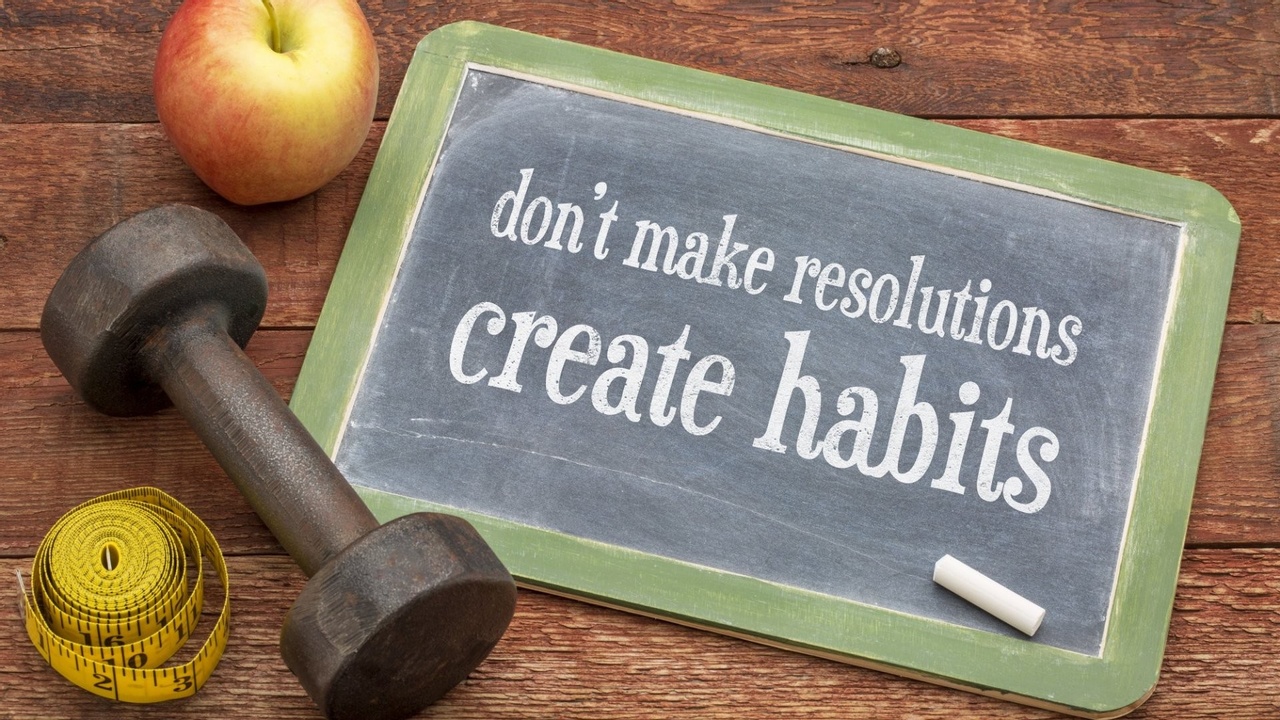Ditch Your New Year’s Resolutions, You Don’t Need ‘Em
Feb 01, 2021
Have you bailed on your New Year’s resolutions yet? I don’t know why we even bother with them. It’s nearly impossible to keep them. Did you know that 50% of US adults resolved to do more exercise and 48% said weight loss was their goal?1 It’s pretty much the same every year. And so is this sad fact. By mid-February, 80% of them give up.
Eighty percent!
So why do we still bother setting resolutions for ourselves on New Year’s Eve? They do not serve us well. I know it’s tradition, and while some traditions can be great, sometimes they’re just plain silly and unnecessary. Take Groundhog Day for instance. Cute, but why?
In the case of new year’s resolutions, I have a strong opinion against them. Because this tradition has too often become a stumbling block to the people I work with—mentally and emotionally. When they don’t keep a resolution, they feel like a failure. And they judge themselves harshly.
They become so disappointed that they’re afraid to try again. They become paralyzed and unable to move forward on any of their goals. Even though it’s still in their heart to do so, they’ve lost faith and give up on themselves.
Why Are Resolutions So Hard To Keep?
Some people say fitness resolutions (or any resolution for that matter) are hard to keep because they are unrealistic. An ideal scenario pops into your mind of how you want to look and you boldly proclaim that “this year I’m going to lose 40 pounds, stop eating all junk food, workout at the gym three times a week, and be back in a bikini by June.”
Great ideas, all of them. Worthy of going after for sure. But how are you going to do all that? Especially if you’re not crazy about exercising anyway. How will you accomplish it?
- Have you tossed out all the junk food in your home?
- Have you created a healthy meal plan you and your family can follow?
- Have you decided in advance as to how you will respond when it’s someone’s birthday at the office and they’re serving those mouth-watering, gourmet cupcakes from that trendy bakery that you’ve been dying to visit?
- Did you purchase a gym membership yet?
- More importantly, did you cross something off your to-do list to make room for those three, 1 hour-long workouts each week? You know that gym is on the other side of town, right?
- One last question-do you even like to go to the gym?
I’m not trying to be Debbie Downer but, if you don’t take the time to think things through, your bold resolution won’t do you a bit of good. In fact, it will cause you to feel like a failure because you couldn’t make it happen.
The problem isn’t the desired goal. The problem is that there is no foundation or plan for success. Only a bold statement. This is why I prefer a different approach when coaching my clients. It’s part of the Weight Loss Blueprint created for each client.
Forget Resolutions, Build Healthy Habits Instead
Instead of making hasty resolutions, make a decision to commit to establishing a new habit instead. Take that bold vision of yours and break it down into some actionable steps. Ask yourself what you will have to do to make that goal become a reality.
Then break it down into even smaller practical steps you can take daily. Take the time to answer questions like those listed above. What do you need to change in your environment to help you succeed?
A meal plan made in advance?
Groceries on hand to make those meals?
An air fryer?
Take the time to think it through and plan it out on paper. This is how to build a solid foundation for successfully creating a new health habit.
What’s The Best Kind Of Exercise?

In order to establish a habit of regular exercise, you need to enjoy doing it. Otherwise, you will not be able to keep at it week after week, month after month. When my clients are asking me what kind of exercise they should do my answer is always this.
What kind of exercise can you imagine yourself happily doing every day?
You’ve probably heard me say this before. Exercise is not a punishment. It’s not something you must do more of if you overindulge. That kind of thinking makes exercise the enemy. It puts exercise in a negative light. And it will keep you from enjoying the benefits of exercise and healthy life.
If you think like this, I want to challenge you on how you think. The fact is everyone can enjoy exercise. Yes, even you! It’s a good thing. It makes you feel good, happy, energized. It helps you achieve your wellness goals. Exercise is your friend. Start to think of it that way.
And here is another thing I want you to change about how you think of exercise. Exercise is not going to make you miserable. The trick is to find a type of exercise or movement that you enjoy.
That’s it. Pick a form of exercise that you enjoy.
If you can happily engage with physical activity or exercise, rather than feel obligated to do it, you will reframe the way you look at exercise altogether! Instead of dreading it, you’ll look forward to it. And if you look forward to it, you’ll establish this new habit much, much easier.
So here is my challenge to you—find something you can enjoy.
You cannot sustain a new habit long term if you hate it. It’s a waste of your time and energy. Instead, find a type of exercise or body movement that you truly love. Dancing is a great example that most people don’t consider. Or how about swimming?
Do you like tennis? That’s exercise. It doesn’t always have to be done in a gym setting. Think outside the box and choose an activity that actually makes you feel happy. Something you could imagine doing every day and even look forward to.
I know you’ve been told that you have to do high-intensity workouts. That the only way to burn fat is to do lots of cardio, weight training, and sweat out those calories. But that’s only true for some people. Body types vary as do health needs. Your choice of exercise needs to fit you.
A Little About The Scientific Benefits of Regular Exercise
Besides losing unwanted pounds, there are some amazing long-term benefits of exercise you may not know about. Scientific studies have proven that people who exercise regularly decrease their risk for many common illnesses.
Because regular physical exercise reduces inflammation that leads to disease, it reduces your risk of –
- Alzheimer’s
- Dementia
- Diabetes
- Cardiovascular disease
- Stroke
- Cancer to name a few2
Regular exercise also –
- Reduces joint pain associated with arthritis
- Strengthens bones as well as your muscles
- Improves blood circulation
- Creates endorphins and enkephalins that make you feel good, happy
- Improves brain functions, such as memory
- Balances your emotions
- Reduces stress3
If all that’s not enough incentive, how about the scientific studies that prove exercise slows the aging process.4 It has to do with something called telomeres, a compound structure found at the end of your chromosomes.
Telomeres keep your DNA code intact, so to speak. They ensure that your DNA is replicated properly when cells divide. As we age telomeres wear down and cause our DNA to be replicated poorly. And poorly replicated DNA is what leads to illness and all the familiar signs of aging you want to put off as long as possible. Exercise slows that process down!
So Ditch The New Year’s Resolution, You Don’t Need It
I think I made my point. Find a type of exercise you love. Pick something you truly enjoy and can stick with long-term. Otherwise, you’ll quit. Choosing something that isn’t right for you, something you really dislike can also be counterproductive. But that’s a topic for another day.
Just know this. If you’re struggling right now to keep going, I want you to know that you can start again. Right now. Today. Every moment you have the opportunity to make a choice. So please don’t give up on yourself. You can do it.
If you think you’ve run the course as far as you can on your own and want help, contact me for some one-on-one coaching. I will help you cross the finish line.
Endnotes
- “The Role of Exercise and Physical Activity in Weight Loss and ….” 11 Oct. 2013, https://www.ncbi.nlm.nih.gov/pmc/articles/PMC3925973/. Accessed 21 Jan. 2021.
- “Lack of exercise is a major cause of chronic diseases.” https://www.ncbi.nlm.nih.gov/pmc/articles/PMC4241367/. Accessed 21 Jan. 2021.
- “Happiness & Health: The Biological Factors- Systematic ….” https://www.ncbi.nlm.nih.gov/pmc/articles/PMC4449495/. Accessed 21 Jan. 2021.
- “A lifetime of regular exercise slows down aging, study finds ….” 8 Mar. 2018, https://www.sciencedaily.com/releases/2018/03/180308143123.htm. Accessed 21 Jan. 2021.


